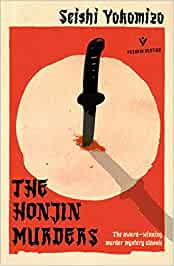 The Honjin Murders
by
Seishi Yokomizo
The Honjin Murders
by
Seishi YokomizoMy rating: 5 of 5 stars
Well, this is my first of both translated Japanese mysteries and in particular, Seishi Yokomizo-san. I was vaguely familiar with the author's name from it being mentioned in some Detective Conan episodes. What I didn't know was how famous this author is in Japan, which googling the book afterwards amply told me.
The Honjin Murders is the first book in a series of 77 novels featuring the scruffy looking young detective Kosuke Kindaichi that Seishi-san wrote in his lifetime. Only two of the series have been translated to English till date.
The story of The Honjin Murders starts with a cheery narrator, fascinated by a crime committed ten years ago in the remote village of Yamanaza, visiting the location in order to get the material for his book on the same. Soon the reader learns about the Ichiyanagi family, their honjin lineage, the events before the fateful night and the greasome crime. The bride and the groom are found dead in their bedroom on the very night of their wedding day. Moreover, the main tatami room of the annex house, where the dead bodies lie, is locked from the inside and no outgoing footprints are visible on the recently accumulated snow outside. The mysterious three-fingered man, who was asking the way to the Ichiyanagi mansion, becomes the prime suspect, soon to be himself found murdered nearby. But is he really? And why is a sickle left embedded in the camphor tree outside the annex? And who plays the Koto in the night? More importantly, why does it seem like everyone of the family is hiding something?
When I took up the book, I wasn't aware that the story was first serialised more than half a century ago. As a modern reader, having read, watched and felt so many adaptations and derivations of classic mystery stories like this, there isn't much surprise in the tale. Ones all the characters have been introduced and the scene set, it's easy to more or less deduce all the rest of the story. Especially, since it's known that writers embed clues throughout the book, which any astute fan of the genre knows how to look for. However, in spite of this, this book was an interesting read, primarily because of two reasons. One, that it introduces Kindaichi-san, of which I would love to read more, to the point of going for the original Japanese editions, if necessary. And two, that the story emphasises numerous Japanese traditions and day-to-day things from the typical village life of 1937. There is a strong resemblance of watching a present-day mystery anime episode when reading the book. I think it's the quality of translation that lets some of the beauty of visually instructive writing of the original intact.
If not for the modus operandi, then atleast for the setting and the characters and for Kindaichi-san, The Honjin Murders is a quality read.
Comments
Post a Comment